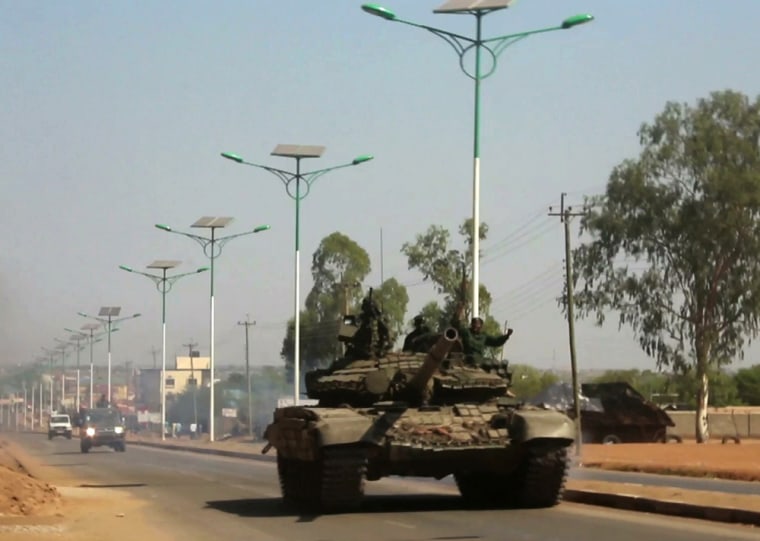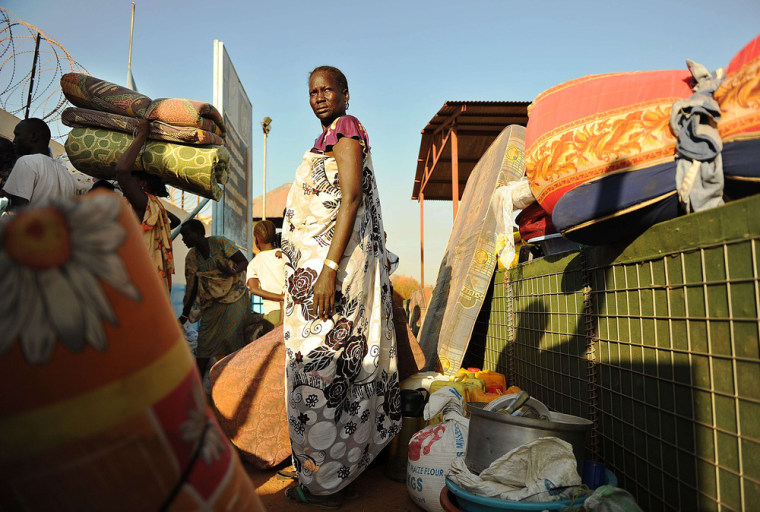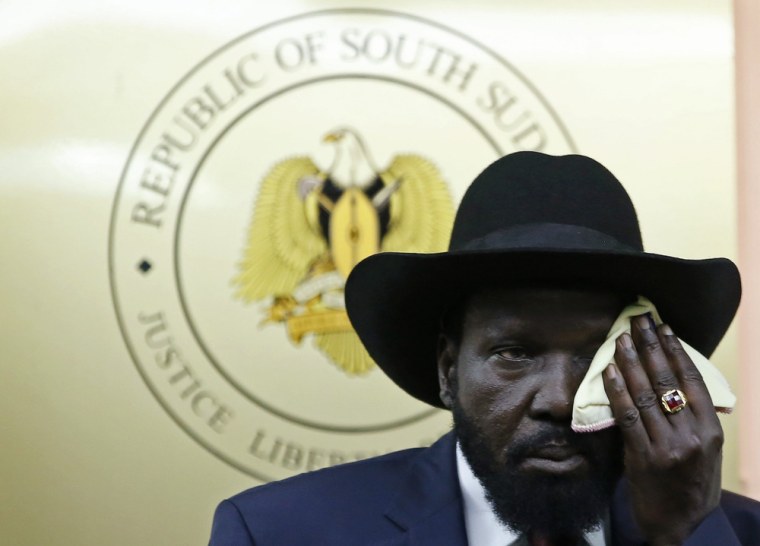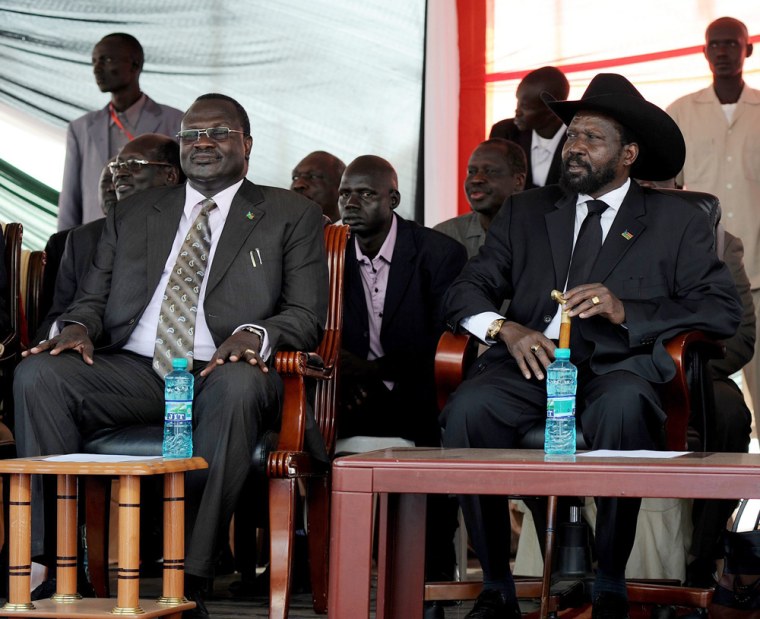
The world's youngest country is grappling with deadly growing pains, with hundreds killed this week amid fears that the violence may descend into the kind of ethnic bloodbath not seen since Rwanda in the 1990s.
Three U.N. peacekeepers are among 500 people killed and 800 wounded in South Sudan since Sunday night, when gunbattles erupted between army factions loyal to the country's president and his former vice president, who are members of different tribes. The conflict has deepened divisions in the two-year-old nation.

Roughly 34,000 people have sought refuge in U.N. camps and the U.S. and other countries are evacuating non-essential embassy staff and citizens. President Barack Obama said in a letter to Congress that 45 military personnel were dispatched to South Sudan on Wednesday to protect U.S. citizens and property.
The U.N. Office for Coordination of Humanitarian Affairs reported that civilians were among "hundreds of patients, including many with gunshot wounds" being treated in hospitals.
On Thursday, India's ambassador to the U.N. said militia groups had "targeted and killed" three of the country's soldiers serving as peacekeepers in South Sudan. The Security Council scheduled an emergency meeting for Friday morning.
Before the peacekeepers were slain, the United Nations had said its 7,000-strong force would not intervene in the conflict.
One government worker told NBC News that friends had revealed in panicked phone calls that soldiers were going door-to-door and making residents speak so they could determine their tribe.
If they were Nuer – the tribe of the former vice president – they "would get killed immediately," ministry of education employee Georget Roro said.
"I heard a lot of gunfire," said Roro, who lives near the barracks where the clashes first erupted on Sunday. "I couldn't see anything because I was hiding but we could hear the firing and the movement of the tanks. It was horrible."
South Sudan's President Salva Kiir blamed the skirmishes a coup attempt by backers of former Vice President Riek Machar, whom he dismissed in July. Eleven people, including seven former ministers, have since been arrested and Machar is being sought for questioning.
Human Rights Watch said Thursday that South Sudanese soldiers fired indiscriminately in highly populated areas of Juba earlier in the week.
But while its origins may lie in a politics, experts are concerned the conflict is rapidly turning into much more.
The U.S.-based Alliance for South Sudanese in Diaspora alleged that "people are being killed by their ethnicities and region of where they come from in South Sudan" and expressed concern that the violence could escalate into "mass killing like what happened in Rwanda in 1994 and Darfur in 2003."
About 800,000 were hacked, shot or clubbed to death in Rwanda during 100 days of ethnic violence in 1994.
Former government official Jok Madut Jok echoed such fears – although he was quick to reiterate that ethnic tensions did not spark the fighting.
"The longer this goes and the more desperate the political leaders get however, the more likely they are to play the ethnic card," the former undersecretary in the country's ministry of culture who is now chairman of The Sudd Institute think tank told NBC News.
South Sudan is a nation of 11 million people the size of France, which has been struggling to build a functioning state since winning independence from Sudan in 2011.

Machar, the former vice president, has denied any attempt to seize power. However, he did say he would run for president after being ousted. Machar also accused Kiir, who is a member of the dominant Dinka clan, of acting like a dictator.
As fighting spread, gunbattles have erupted in the town of Bor, which was the scene of a 1991 massacre by soldiers loyal to Machar of hundreds of Dinkas.
"The notion that there was a coup was fabrication by the president to eliminate democracy," Machar tweeted Thursday, and urged people to stay calm.
Marchar also stressed that "the issue is not between tribes."
Islam Altayeb, a Bahrain-based research analyst at the International Institute for Strategic Studies, said alleging a coup was a simple way of discrediting opponents while allowing the accusers to consolidate power.
"Regardless of whether it was a coup attempt or not the fact is that it could endanger the stability of South Sudan," she said. "You have a lot of former militants and fighters, together with a very high number of weapons, this is an explosive recipe."

South Sudan's government declared that its security forces "are in absolute control of the situation," but admitted later Thursday that the central government had lost control of Bor, the capital of the country's largest and most populous state, where barrages of gunfire were reported.
"The situation in South Sudan can be best described as tense and fragile. If it is not contained, it could lead to ethnic cleansing," Choul Laam, a top official with the ruling Sudan People's Liberation Movement, told The Associated Press from Nairobi, Kenya.
Toby Lanzer, the U.N.'s deputy special representative to the secretary general for South Sudan, told NBC News that there was a "palpable sense of fear" among the thousands of civilians who had sought protection in United Nations bases near Juba, the country's capital.
Roro, the government worker, said that many people in South Sudan were speculating that "there will be war."
She added: "The civilians have a very limited understanding of the politics and it seems to be becoming an ethnic fight. Anything that happens is being taken personally and ... they take it on a tribal line, a tribal perspective. People are saying there will be a revenge day that will be even worse than this week."
Reuters and The Associated Press contributed to this report.
Related:
